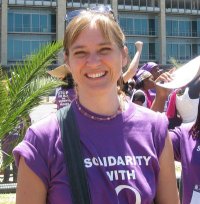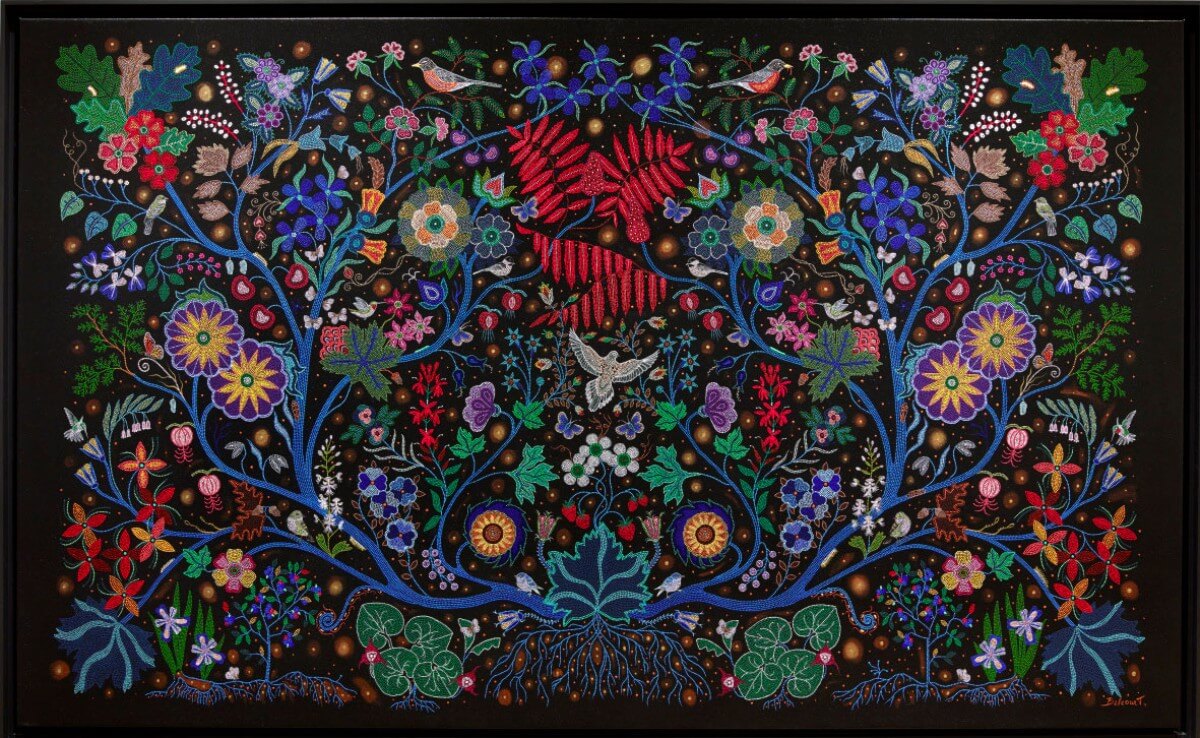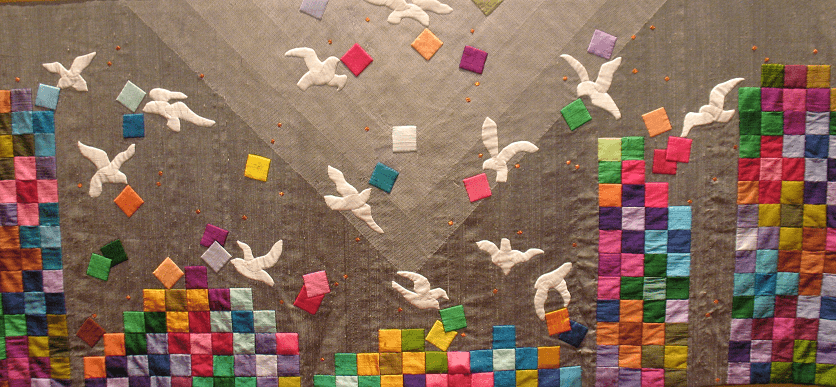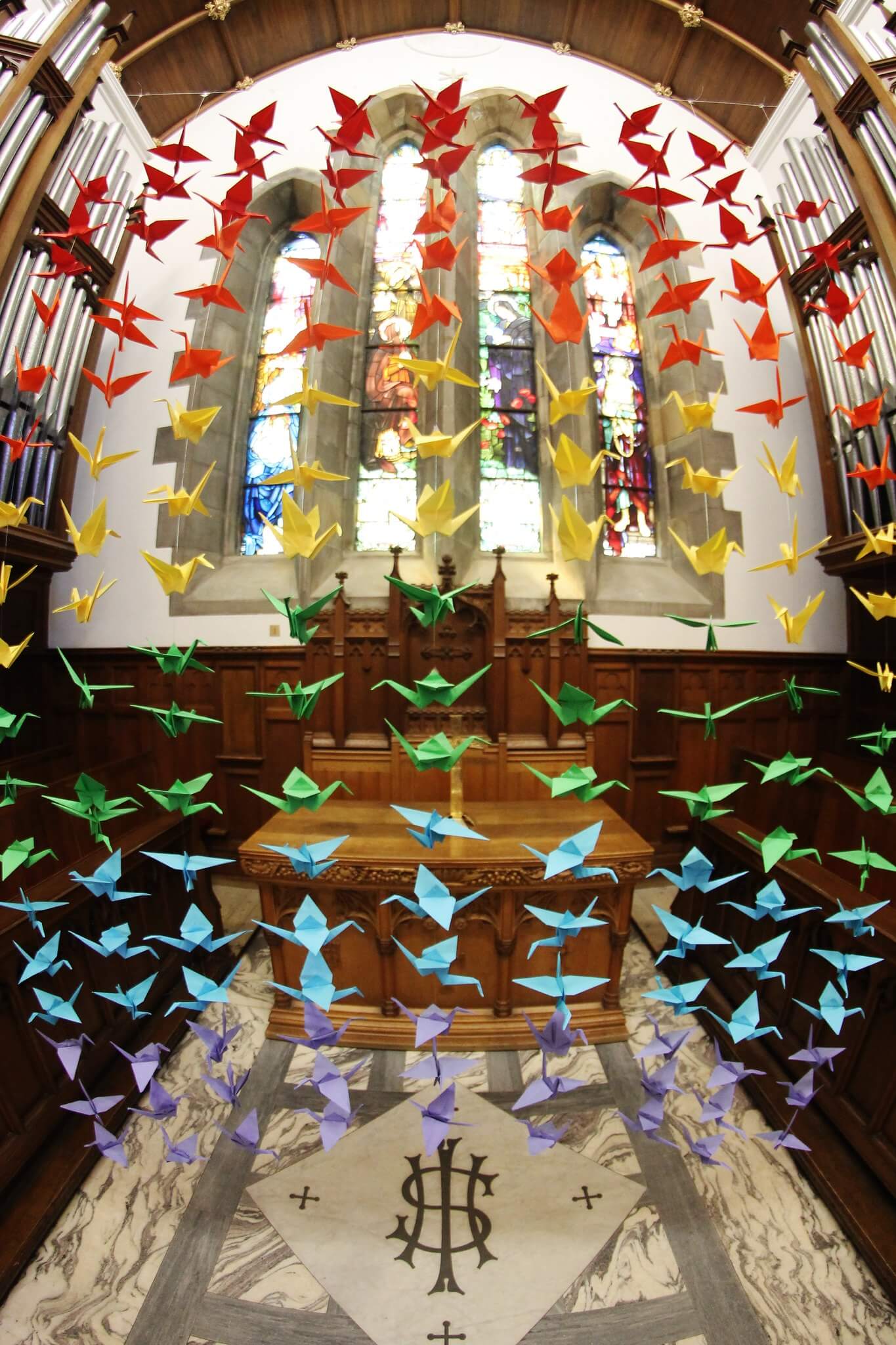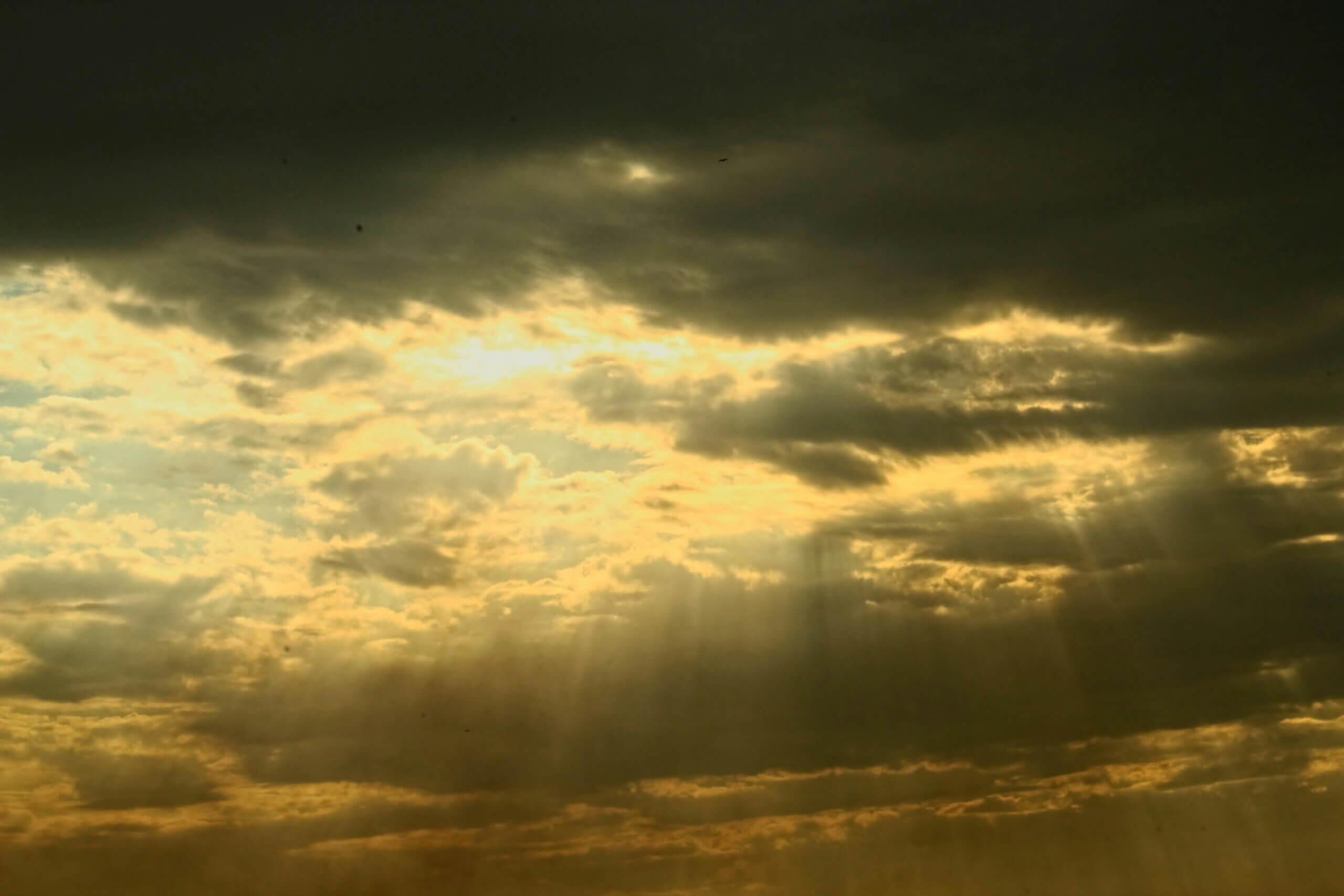Homily at the Ordination to the Priesthood of Joyce Barnett
September 14, 2010: The Church of the Holy Trinity (Gospel text: John 12: 20-36)
Jennifer Henry
Last month I read The Jerusalem Testament—sixty-eight ecumenical statements from the heads of the churches located in Jerusalem, spanning the period from 1998 to 2008. Some full treatises, some gestures of hope, some letters of desperation–each were a fragment of the contextual theology of Palestinian Christians. I was struck that amongst the gut-wrenching statements triggered by dramatic news events, there were the annual messages of Christmas and Easter, of Bethlehem and Golgotha. In the midst of the terror happening around them, ordinary moments in the church year were consistently marked. In the midst of terror, the celebration of extraordinary moments in our shared faith—the child of God born in a stable, the crucified rabble-rousing teacher raised from the dead—helped to sustain them.
“Unless a grain of wheat falls into the ground and dies,” says the Gospel for today, Holy Cross day. “Unless a grain of wheat falls into the ground and dies, it remains a single grain; but if it dies it bears much fruit.” Death to rebirth, death to new life–hymn writer Walter Farquharson calls this the “paradox of womb and grave.” Women often know this paradox in their own bodies—word made flesh. The moment midwives call “transition”—the moment just before the productive pushing that leads to a birth–is a holy, dangerous time when everything comes unravelled and you have a sense that you are on the cusp of either life or death. There is a literal thinning, as if between the worlds, and only labouring through pain—a kind of death to self–brings new life to birth.
This excerpt from Frances Franke’s poem, Did the Woman Say?, makes a similar embodied connection, taking us from birth to death, from Mary’s body to Christ’s Body broken and shared.
Did the woman say,
When she held him for the first time in the
Dark, dank of the stable
After the pain and the bleeding and the crying,
“This is my body; this is my blood?”
Did the woman say,
When she held him for the last time in the
Dark, rain on a hilltop,
After the pain and the bleeding and the dying
“This is my body; this is my blood?”
Birth and death—markers of the full range of the human experience made sacred by God with us, God one of us. Death transformed to rebirth, to the promise of new life, by the Holy Child wounded for us, wounded with us, raised and recalled in community with memory and hope.
Tonight Joyce, deacon in the church, becomes priest. We invite her renewed leadership not as some kind of “spiritualized” entity, but as her embodied self—woman, wife, mother, counsellor, friend—with all the holiness that she draws from human life. We invite her “real presence”, as she strives to live consciously and publicly the paradox that is the gospel. We invite her to help build the Body of Christ, nurturing paradoxical communities of faith–grain of wheat communities that at the same time embrace the certainty of death, the certainty of resurrection (of new life) and the uncertainty of most everything else.
“Unless of the grain of wheat falls into the ground and dies”…Death constantly surrounds us, and yet for many in our culture, distanced from the cycles of nature, seduced by the miracles of medicine, death has become unreal, or worse, a curse. A healthy community of faith recognizes the certainty of death, as an integral part of new life. This can be as simple as attending to the seasons, liturgical but also natural, where today in my garden ripeness turns to the rot that will be fertile soil for spring flowers. Or it can be as complex as helping families greet death with sadness, yes, but with a little less terror. We need leadership that can help communities fully attend to the sacredness of the Body of Christ broken again in every death.
In this time in the life of the church, it also means attending to the certainty of lesser losses. As old modes of religious power wane, it is evident that some things in church must die to make space for what is new. I work with Catholic religious women facing a form of extinction who bravely ask, “How do we let institutional religious life as we know it die, in such a way as to breathe new and sustained life into the charisms of our foundresses? We need leadership that can nurture congregations to face the death of rigidities, privileges, traditions, and even some theologies, with sadness, but not terror, in such a way as might breathe new life into our commitment to the gospel. We need leaders who can midwife changes in church that account for the way life and spirit constantly revises, repairs and amends our understanding of the mystery of God.
Jesus continues…“But if it dies it bears much fruit.” We need to nurture communities who can hold death, and simultaneously hold the certainty of resurrection. Julia Esquival, writing out of the centre of Guatemala’s crucifixion in 1983, called this the “certainty of spring”: ‘They can cut all the flowers, But Spring will always return.’ Guatemala you will bloom.” I hear echoes of her confidence in the transforming, resurrecting power of God in the human rights defenders I meet today from Congo or Colombia. Their deep faith that another world is possible—in life after, but also in the midst of death—does not release them from agency, but rather seems to propel them further into the struggle for social change, as collaborators with our transforming God. Their audacious, courageous, active hope in the midst of terror is their decision to be worthy of a God who can do more than we can ask or imagine.
What then is the responsibility of our faithfulness? How does our belief in the transforming power of God propel us into action here and now? We need leaders who can coax communities of complacency into Easter action of social change—leaders who can, as Walter Brueggemann puts it, foolishly “enact obedience to a daring claim, obedience to a possibility” even in the face of the “stubbornness of Caesar.”
To be certain of resurrection, is to celebrate the endless possibility for good and the limitless love of a God whom “death could not contain.” (from the prayer by Janet Morley) In communities who seek to live “resurrected life”, human barriers and rigid orthodoxies that try to box and contain God’s love fall away. Hear the words of a most famous Anglican leader citing another part of today’s Gospel:
When Jesus spoke of being lifted up on the cross he said “I, if I be lifted up will draw..” – he didn’t say “I will draw some” – he said “I, if I be lifted up will draw ALL – draw all to me to hold them” all of us drawn into the divine embrace that excludes no-one – black, yellow, white, rich, poor, educated, uneducated, male, female, young, old, gay, lesbian, so-called straight – yes it IS radical. All, all, ALL belong.
This is of course Archbishop Tutu whose passion has inspired so many communities to Easter acts of transformation.
Communities that find certainty in death and resurrection, become aware of the uncertainty of all else–money, privilege, literalism, institution, empire–finding comfort instead in change, difference, and messiness. As we look at the changing world around us, we recognize fresh winds of the Spirit when “monochromatic, unbending” places, are transformed to “pluralism, variability” and a rainbow of colour (Harvey Cox). Theologian Harvey Cox speaks of today’s children who live everyday with a web-heightened view of a diverse world, and who–he asserts with the certainty of spring–will bring an end to fundamentalism all around the world.
25 years ago, Joyce’s progress towards the priesthood was halted by discrimination. While there is great joy in today’s ordination, there is for me also a sadness that church communities have been denied her priesthood for these many years. There is a sadness that many at Holy Trinity–Alvin, Pauline, Helen and others whom you name in your hearts–have not lived to see this day. Others, still alive, who could no longer abide this (and related injustices) are also not here as witnesses.
Joyce’s progress towards the priesthood was stopped, her diaconal role constrained, and yet her ministry has always continued–a ministry that has borne much fruit
In her counselling practice, Joyce has nurtured clients to come to grips with the certainties of death and lesser losses. She has helped people to grieve, rage, accept, and remember. At Holy Trinity, she has tended to the dying and celebrated lives in ritual. She has helped raise our children in our shared faith, married the young and old, and walked with us for change in the church and in the world. Her ministry has more than prepared her to serve the church as priest, to be midwife to death and loss, to be midwife to change and new life.
Despite grief at a call seemingly denied, she sheltered the hope that she would one day serve the church as priest, and so did we. There is a Spanish expression, abrigar esperanza, meaning to shelter hope or to keep hope warm. Because we understood her vocation to priesthood as shared–a vocation that is hers and ours–many bodies huddled together to keep her hope warm. Her priesthood will be a grain among many grains, a priesthood of all believers, more than ready to bear fruit not just of this community, but throughout the diversity of God’s people.
Despite the small deaths and large losses of injustice, she with Alison, Hannah and Rob have lived resurrected life. Turning their hope into action, barriers have fallen with great consequence. Another world has been made possible. Legal certainty for children of same sex parents, marriage of same sex couples–these are realities in our Canada because they had the courage to walk with others towards that transformation.
When our daughter Bella was adopted, we took tulips to Joyce and her family to say thank you for grain that bore much fruit–for doors opened, and a struggle waged for us (a struggle which like any other was not without its costs). Some would call these secular gains, but I know that Joyce and Alison’s lived commitment to equality comes from a very deep faith that God holds all in the “divine embrace”. (TuTu)
And I know their faithful actions have saved lives. For every teenager considering suicide because of messages about their sexual orientation from family or church, there has been one more message towards choosing life , life in abundance. Perhaps today there is also one more.
Today, Joyce steps across this threshold with unwavering commitment to be a faithful witness to the gospel. She brings with her all she has learned from the sacredness of human experience. She steps into this new role, committed to continue to learn and grow, prepared to express and nurture the ministry of the communities that she will serve.
I will be honest that I do not know clearly what this moment means. What I do know is that someone with a persistent call, solid training, compassion for people, wisdom from struggle will be priest in a church that desperately needs her. And that is a good thing. And goodness can be contagious
When Joyce was three or four years old, she declared that she was no longer willing to go to church. When her family inquired why, she said–well, I have been to church three times and I haven’t seen Jesus yet. Let us celebrate today that she grew out of her impatience (and her literalism). Let us also celebrate that her courageous questions and her desire to see Christ revealed in community, a desire as ancient as the Greeks of today’s Gospel, has endured. Let us pray that a change may come for others who seek to serve Christ—others with a call, gifts, and a queerness equally needed in the diversity of today’s church—but perhaps with little less patience.
This ordination will open new possibilities for Joyce’s ministry. But wherever she goes next, she will, also, always be a priest of this place–a loving, justice seeking, imperfect community that seeks to hold, for one another hope in despair, life in death. Wherever you go, you will take with you our capacity to love, our commitment to justice, and our messy imperfections. Your ministry will always be our ministry. And together, with the whole church, we will be the Body of the Liberating Christ, whose dance is resurrection. We love you. Blessed be. Amen.
References (in the order of their appearance):
May, Melanie A. The Jerusalem Testament. Wm. B. Eerdmans Publishing Co, 2010.
Franke, Frances Croake. “Did the Woman Say ?” Celebrating Women. Janet Morley and Hannah Ward, 1986.
Esquival, Julia. The Certainty of Spring: Poems by a Guatemalan in Exile. EPICA, 1993
Brueggemann, Walter. “Preaching as Sub-Version.” Deep Memory, Exuberant Hope: Contested Truth in a Post Christian World. Fortress Press, 2000.
Tutu, Desmond. “God’s Dream.” Sermon delivered at the Chapel of King’s College, London., Sunday 22 February 2004.
Cox, Harvey. “Why fundamentalism will fail: A seemingly unstoppable force is being undone from the inside.” Boston Globe, 8 November, 2009. .

